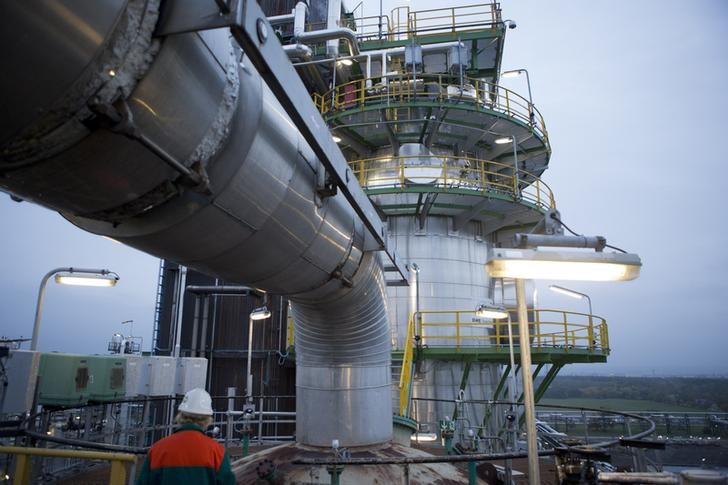By Laila Kearney and Devika Krishna Kumar
NEW YORK (Reuters) - Companies that transport oil by rail are prepping for a business surge after a federal judge ordered the largest crude pipeline out of North Dakota to shut within a month, market sources said on Monday.
Shipping by rail will be among the few options left for oil producers in the second largest oil producing U.S. state, providing a boon for transport firms forced to furlough workers during the coronavirus-triggered economic downturn.
A U.S. district court ordered pipeline operator Energy Transfer (NYSE:ET) to shut the 557,000 barrel-per-day Dakota Access pipeline (DAPL) and empty the line pending an environmental review that would keep it shut for at least a year.
"I think everybody is forming their game plan now, and if they have tank cars, they're probably thanking their lucky stars," said one source familiar with Bakken rail operations.
The line runs from North Dakota's Bakken shale basin to Patoka, Illinois. Bakken crude shippers have been exploring crude-by-rail options on Monday, but it is too early to say how much the closure will affect the rail business, the source said.
There are enough tank rail cars to compensate for DAPL's lost capacity, two sources with knowledge of the matter said, but staffing may be a challenge initially.
"The assets are available but the staffing is not in place to ramp up quickly in my opinion," said Elliot Apland, managing member at MarbleRock Advisors which helps negotiate rail supply chain contracts.
"Also, if railroads do decide to call back furloughed employees or hire new employees, they are going to have to be certain the assumed shutdown period will last at least a year and justify the staffing increase," he said.
Less crude is available to transport from the region than a few months ago after many producers cut output due to the demand slump caused by coronavirus lockdowns.
Production in North Dakota has fallen roughly a third from a peak of more than 1.4 million barrels a day.
"There is ample rail capacity and therefore crude oil will still find its way out of the basin, albeit at a higher cost if this ruling stands," Nicholas O'Grady, chief executive of Bakken-focused producer Northern Oil and Gas Inc (A:NOG), said in an interview.
The pipeline closure could prevent companies from boosting output when demand recovers, and will add costs as rail transport is typically more expensive.
"Production will need to be 950,000 bpd or lower or barrels won't be able to clear for August," one source at a Bakken producer said.
Bakken crude prices fell on Monday to their deepest discount against benchmark crude futures since early May, traders said.
Smaller alternative pipelines out of the Bakken have limited spare capacity to compensate for DAPL's closure, sources said. Kinder Morgan (NYSE:KMI)'s Double H pipeline and True Companies' Belle Fourche pipeline may have some capacity, sources said.
At full capacity, DAPL carries the equivalent of seven to eight trains per day, Apland said. Other regional pipelines could absorb about two to three trains' worth, he added, leaving the rest for rail.
The closure could rejuvenate an oil transport industry that has declined since DAPL began operating in 2017.
"The Bakken was the original home to crude by rail," said Rusty Braziel, CEO of Houston-based consultancy RBN Energy.
"If it turns out production comes back, and there are still a lot of crude by rail terminals in North Dakota, this is something that will motivate a lot more crude by rail shipments from that area than we've seen in a long time."
